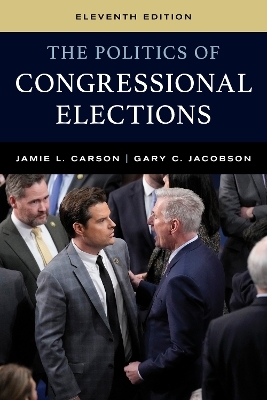
The Politics of Congressional Elections
Rowman & Littlefield (Verlag)
978-1-5381-7673-3 (ISBN)
The eleventh edition offers an engaging examination of congressional candidates, campaigns, and elections by incorporating coverage of the most recent elections and the changing roles of voters, incumbents, challengers, and campaign contributions. This edition also highlights the impact of the January 6th insurrection, inflation and the economy, the Russian invasion of Ukraine, infrastructure legislation, and the narrowing majorities in both chambers. Brought completely up-to-date with the latest data from the American National Election Study, the Cooperative Election Study, and the Federal Election Commission, and including coverage and analysis of the 2020 and 2022 elections, this seminal work continues to offer a systematic account of what goes on in congressional elections. Moreover, the authors’ framing demonstrates how electoral politics reflect and shape other components of the American political system, with profound consequences for representative government.
Key revision highlights include:
Updated coverage through the 2022 elections including congressional primaries
Expanded analysis of campaign finance and voter behavior in recent elections
Updated figures and tables, with color versions available in the e-book and PowerPoint slides
Greater emphasis on nationalized politics and a return to more party-centered elections
Enhanced analysis of congressional elections data back to the pre–Civil War era.
Jamie L. Carson is the UGA Athletic Association Professor of Public and International Affairs II in the Department of Political Science at the University of Georgia. He received his PhD from Michigan State University in 2003, where he was a fellow in the Political Institutions and Public Choice Program. Carson’s research interests include American politics with a specific emphasis on the U.S. Congress, congressional elections, separation of powers, and American political development. His most recent books include Nationalized Politics: Evaluating Electoral Politics Across Time (with Joel Sievert and Ryan Williamson) and Change and Continuity in the 2020 and 2022 Elections (with John Aldrich, Brad Gomez, and Jennifer Merolla). Gary C. Jacobson is Distinguished Emeritus Professor of Political Science at the University of California, San Diego. He received his PhD from Yale University in 1972 and has served on the Council of the American Political Science Association and on the Board of Overseers of National Election Studies. Jacobson's field of interest is American national politics, with a subfield focus on Congress and congressional elections, and his current research is on the electoral basis of partisan polarization in Congress. Among books he has authored or coauthored are Money in Congressional Elections, The Electoral Origins of Divided Government, and The Logic of American Politics.
List of Figures
List of Tables
Preface
1. Introduction
2. The Context
The Constitutional Framework
Congressional Districts
Partisan Gerrymandering
Redistricting between Censuses
Racial Gerrymandering
Bipartisan Gerrymanders
The Republican Advantage in House Districts
States as Electoral Units
Election Laws
Political Parties
Social and Political Contexts
Conclusion
3. Congressional Candidates
The Incumbency Factor
Measuring the Value of Incumbency
The Vanishing Marginals
Sources of the Incumbency Advantage
The Institutional Characteristics of Congress
Changes in Voting Behavior
Constituency Service
The Variability of the Incumbency Advantage
Discouraging the Opposition
Money in Congressional Elections
The Connection between Money and Success
Why Campaign Money Is More Important to Challengers Than to Incumbents
The Career in the District
Motivating Challengers
4. Congressional Campaigns
Campaign Money
Contributions to Candidates
PACs
PACs and the Pivotal 1994 Election
Party Money
Contributions from Other Members of Congress
Self-Financing by Candidates
Fund-Raising Tactics and Donors
Independent, Voter-Education, and Issue-Advocacy Campaigns
Campaign Organizations
Campaign Strategies
Campaign Media
Personal Campaigning
Campaign Messages
Challengers’ Campaigns
Going Negative
Incumbents’ Campaigns
Candidates for Open Seats
Senate Campaigns
Manipulating Turnout
Conclusion
5. Congressional Voters
Turnout in Congressional Elections
Who Votes?
Partisanship in Congressional Elections
Alternative Interpretations of Party Identification
Partisanship and Voting
Partisanship and Incumbency
Information and Voting
Recall and Recognition of Candidates
Contacting Voters
Changing Evaluations of Incumbents
6. National Politics and Congressional Elections
Political Interpretations of Congressional Elections
Models of Aggregate Congressional Election Results
Presidential Coattails
National Conditions and Strategic Politics
Campaign Themes
House Elections, 1992–2022
1992–2000
2002–2010
2012-2020
The 2022 Midterm Election
Senate Elections, 1992–2022
1992–2000
2002–2010
2012-2020
The 2022 Senate Elections
Conclusion
7. Elections, Representation, and the Politics of Congress
Representation
Policy Congruence
Constituents, Interests, and Causes
Representation by Referendum
Descriptive Representation
Policy Consequences
Particularism
Serving the Organized
Responsiveness without Responsibility
The Congressional Parties: Decline and Revival
The Revival of Party Cohesion, 1980–2022
Ideological Polarization in Congress and the Electorate
Polarization in Presidential Support
Party Polarization: The Electoral Connection
Diverging Electoral Constituencies
Chicken or Egg?
The Downside of Strong Party Government
The Public’s Evaluations of Congress
Reforming Congress
Term Limits
2024 and Beyond: Geography, Demography, and Nationalized Politics
Bibliography
Index
About the Authors
| Erscheinungsdatum | 30.08.2023 |
|---|---|
| Zusatzinfo | 67 BW Illustrations, 20 Tables |
| Verlagsort | Lanham, MD |
| Sprache | englisch |
| Maße | 154 x 229 mm |
| Gewicht | 494 g |
| Themenwelt | Sozialwissenschaften ► Politik / Verwaltung ► Staat / Verwaltung |
| ISBN-10 | 1-5381-7673-4 / 1538176734 |
| ISBN-13 | 978-1-5381-7673-3 / 9781538176733 |
| Zustand | Neuware |
| Informationen gemäß Produktsicherheitsverordnung (GPSR) | |
| Haben Sie eine Frage zum Produkt? |
aus dem Bereich


